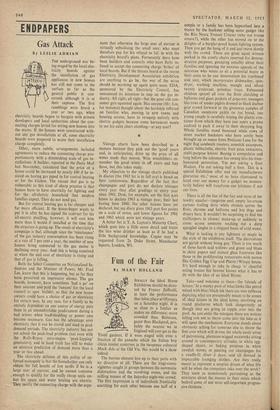ENDPAPERS
Gas Attack
By LESLIE ADRIAN
THE underground war be- ing waged by the local elec- Other, more subtle, arrangements included agreements to reduce the connecting charge pro- portionately with a diminishing scale of gas in- stallations. A builder, reported in the Daily Mail last November, calculated that the price of a house could be increased by nearly £40 if he in- sisted on having gas piped in for central heating or for the kitchen. The reason that gas is so vulnerable to this kind of sharp practice is that houses have to have electricity for lighting and for the all-electric household that modern families expect. They do not need gas.
But for central heating gas is far cheaper and far more efficient. If the house-buyer wants to put it in after he has signed the contract for his all-electric 'dwelling, however, it will cost him more than it would if installed at the time that the structure is going up. The result of electricity's campaign is that, although since the 'renaissance' of the gas industry consumption has been rising at a rate of 7 per cent a year, the number of new houses being connected to the gas mains is declining every year. And this is being connived at when the unit cost of electricity is rising and that of gas is falling.
Both the Select Committee on Nationalised In- dustries and the Minister of Power, Mr. Fred Lee, know that this is happening, but so far they have preserved an impressive silence. The gas boards, however, have sometimes `had a go' on their account and paid the `ransom' for the local council or spec. builder, so that the new house owners could have a choice of gas or electricity for certain uses. In any case, for.a family to be entirely dependent on one source of energy puts them in an uncomfortable predicament during a bad winter when loadLshedding or power cuts become necessary. Gas has the advantage over electricity that it can be stored and used in peak demand periods. The electricity industry has not yet solved the peak-load problem (not even with the Rolls-Royce aero-engine `peak-lopping' generators), and in hard truth has still to make an accurate prediction of demand more than a year or two ahead.
The electricity defence of this policy of en- forced monopoly is that the householder can only obtain the full benefit of low tariffs if he is a large user of current, and he cannot consume enough to qualify for the really cheap units un- less his space and water heating are electric. They justify the connecting charge with the argu-
ment that otherwise the large user of current is virtually subsidising the small user, who must therefore pay for his refusal to fat: in with the electricity board's plans. Fortunately there have been builders and councils who have flatly re- fused to accept the connecting charge `bribes' of local boards. But if the threats heard at the recent Electricity Development Association exhibition are anything to go by, the war of the wires should be warming up again quite soon. EDA, sponsored by the Electricity Council, has announced its intention to step on the gas in- dustry. All right, all right—but the poor old con- sumer gets squeezed again. Has anyone (Mr. Lee, for instance) thought about the hardship inflicted on families who, moving to new towns and housing estates, have to re-equip entirely with electric gadgets because some bureaucrat wants to see his sales chart climbing—at any cost?
Vintage charts have been described as a menace because they pick out the `good' years and, in anticipation, drive up the price of all wines made that season. Wise winebibbers re- member the good wines in off years and buy those, but this takes study.
My objection to the vintage charts published in diaries (the 1965 lot is in full cry) is based on their randomness. Regardless of the fact that champagne and port do not declare vintages every year they allot gradings to every year since 1941. Dow, for example, are the first port house to declare 1963 a vintage year, their last having been 1960. No other houses have yet declared, but my diary gives 1963 port five points on a scale of seven, and lower figures for 1961 and 1962 which were not vintage years.
A better bet is T. A. Layton's Maturity Chart, which goes into a little more detail and treats the tiro wine drinker at least as if he had a little background knowledge. Copies may be requested from 2a Duke Street, Manchester Square, London, WI.


































 Previous page
Previous page